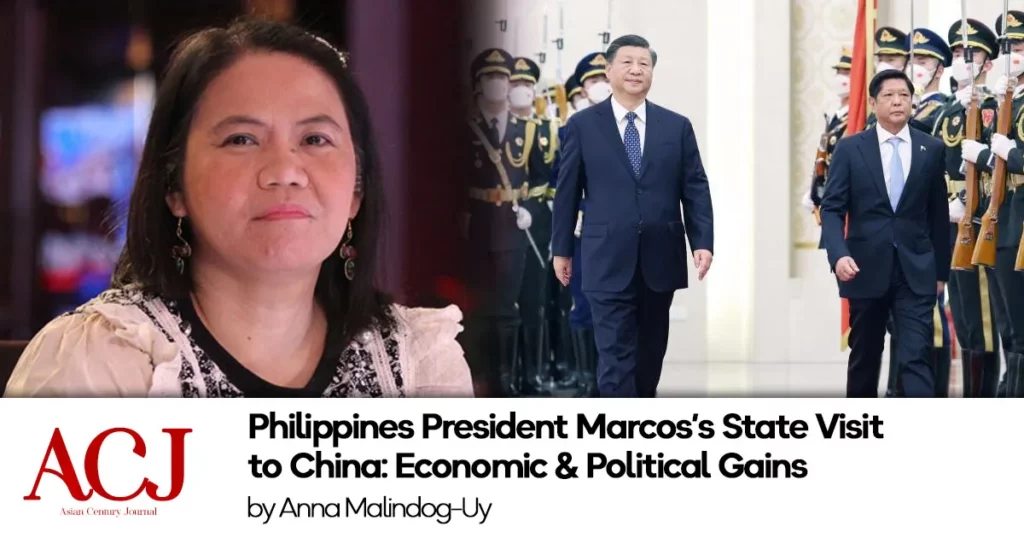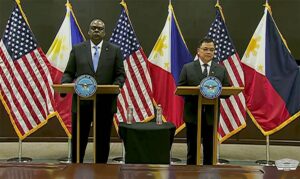
The renaissance of the friendly and good bilateral relations between the Philippines and China despite existing differences is one of the legacies of former President Rodrigo Duterte’s administration that yielded tangible and concrete benefits for both countries and their peoples.
The Philippines-China bilateral relations have not only improved under the Duterte administration but have been upgraded to a “comprehensive strategic cooperation.” Indeed, the ties between the two countries have improved dramatically, boosting friendship and mutual understanding under the Duterte presidency.
Under the leadership of Duterte, no doubt, Philippines-China relations have not only gained some new vitality and were reinvigorated, but likewise, the Philippines has benefited economically from the warm relationship with China, which is vital as the country aims to have a strong bounce back from the economic devastation and recession caused by the pandemic.
China, thus far, remains the largest trading partner of the Philippines, the largest source of imports, the second largest export destination, a major foreign investor, and the second-largest source of tourists in the Philippines. This makes China one of the most important economic partners of the Philippines. Hence, Philippines-China relations are significant to the Philippines, especially on the economic front.
Such friendly and good-natured bilateral ties between the Philippines and China can be credited to President Duterte’s independent foreign policy anchored on the fact that the Philippines is neither beholden nor a pawn to anyone, any country, nor any superpowers.
President Marcos’s Recent Visit to China
In retrospect, the recently concluded state visit of President Ferdinand Marcos Jr. to the most vital and strongest economic partner of the Philippines, the People’s Republic of China (PRC), and the Chinese people were no doubt an overwhelming success. This, in many ways, signifies how the current administration under the leadership of President Marcos Jr attaches importance to Philippines-China relations as a foreign policy priority.
Indeed, the state visit of Philippine President Marcos Jr. to China is an act of reaffirmation of the friendly, traditional, and neighborly relations between the two countries. This visit signals the further deepening of the cooperation between the two countries on the various areas of the bilateral ties and explores and broadens the new areas of engagement. Likewise, the visit of President Marcos Jr to China strengthens the high-level dialogue and leadership between the two countries to effectively and pragmatically manage the differences between the two countries.
Hence, I have no doubt that the state visit of President Marcos Jr. to China and his bilateral meetings with his counterpart, Chinese President Xi Jinping, and other higher-ranking officials of PRC, Premier Li Keqiang and Chairman Li Zhanshu of the Standing Committee of the National People’s Congress last 04 January 2023 were very successful, fruitful, and a historical one.
Under President Ferdinand Marcos Sr., official diplomatic relations were established between the Philippines and China in June 1975. Historical in a sense because, aside from the fact that this is President Marcos’s first state visit to a foreign country in 2023 and the first state visit outside of the ASEAN region, this visit is akin to a commemoration of his father’s legacy in the area of foreign relations, and that’s the establishment of the official diplomatic ties between the Philippines and China. The visit is also significant, for it will define the posture and trajectory of the Philippines-China bilateral relations in the next five years under the Presidency of Marcos Jr.
Thus, I am very optimistic that with the said state visit, the diplomatic and bilateral relations between the Philippines and China under President Marcos’s administration will be fruitful, vibrant, and bright. I also believe that through the said state visit, the relations between the two countries, both state-to-state and people-to-people, have been strengthened and deepened further, and more economic and trade cooperation between the two countries have been established and pursued that will benefit the peoples of the Philippines and China. Furthermore, I am optimistic that the relationship and friendship shared by both countries will flourish more and bring forth tangible benefits to the people of both countries.
Indeed, with utmost enthusiasm, under the Presidency of Marcos Jr., the golden age of Philippines-China relations has begun, painting a more vibrant and rock-solid friendship between the two nations. Looking ahead, I am optimistic that the diplomatic and bilateral relations between the Philippines and China will be bright and booming under the Marcos administration.
Noteworthy Gains
Moreover, aside from goodwill, the state visit of President Marcos Jr. to China has yielded concrete economic and political gains for both sides. Notably, 14 bilateral agreements were signed between the Philippines and China on 04 January 2023 on agriculture, infrastructure, development cooperation, maritime security, and tourism, among others;
In addition, the Chinese investors have committed USD 22.8 billion in investment pledges after President Ferdinand R. Marcos Jr. met them during his state visit to China. These investment commitments include USD 1.72 billion for agribusiness, USD 13.76 billion for renewable energy (RE), and USD 7.32 billion for strategic monitoring (electric vehicle, mineral processing). These are indeed great news for the Philippines.
But I guess the critical gains of the visit are on the political front, which is equally noteworthy, most imperative, and of significant consequence. President Marcos’s assurance and declaration during his bilateral meetings with his counterpart, Chinese President Xi Jinping, that his administration intends to pursue an independent foreign policy and that his administration and the Philippines adhere to and respect the “One China Policy,” which one of the fundamental tenets of the official bilateral relations of the two countries, are no doubt testaments to the two sides deepening mutual understanding and respect on critical issues that are most vital to both sides.
The right-on-track intention and pursuance of President Marcos’s independent foreign policy, characterized by pragmatism anchored on the backdrop that the country is a friend to all and an enemy to none, and the country’s faithfulness to the “One China Policy” has cleared the air and put a stop to the speculations by many that the Philippines has pivoted to the United States. These also clarified and rectified the impressions of many that the Philippines impersonated US “strategic ambiguity” or “strategic uncertainty” as being intentionally ambiguous in which the US says one thing and does another. The One-China Policy/Principle declares that Taiwan is a territory of the People’s Republic of China (PRC), recognized by 181 countries, including the United States.
Likewise, the pursuit of independent foreign policy and adherence to the “One China Policy,” as expressed by PBBM to his counterpart Chinese President Xi Jinping during their bilateral talks on 04 January 2023, in many ways, allows the Philippines to strike more leverage with China because “the apprehension of military encirclement by Washington is a top concern of China in the South China Sea (SCS). Hence, in many ways, such declarations of PBBM appeased and attenuated the Chinese’s uneasiness, anxiety, and apprehension, beckoning that the Philippines will not allow itself to be used as a pawn by the United States, militarily speaking, to encircle China in the SCS. In retrospect, pursuing a genuine and authentic independent foreign policy means neutrality and positioning itself as non-aligned. It also means a “balancing act” between China and the US to a greater extent.
Concerning the disputed waters of the South China Sea (SCS), the country’s pursuit of an independent foreign policy and the mantra of being a friend to all and enemy to none is also most relevant to address the dispute in the South China Sea in a peaceful, amicable, and diplomatic manner. Though we have a conflict of interests and differences with China in the SCS, we don’t view China as an adversary but as a good friend and neighbor because we have close ties on the economic and political fronts. At the same time, we resolve the differences with China diplomatically and peacefully. Hence, we are engaging with China despite the differences and conflict of interests while maintaining close, cooperative, and friendly relations and prioritizing the country’s national interests above all else.
On the other hand, another two of the most critical political gains of President Marcos’s visit to China is Chinese President Xi Jinping’s promise and pronouncement to “find a solution” and compromise to protect the livelihood of Filipino fishermen and avoid any misunderstanding.” In his bilateral talks with President Xi, President Marcos brought up Filipino fishermen’s plight in the South China Sea’s disputed waters, more popularly known in the Philippines as the West Philippine Sea (WPS). The other equally important gain on the political front is the agreement between the two sides to move forward on an arrangement for the establishment of a communication mechanism on maritime issues between the Department of Foreign Affairs (DFA) of the Philippines and the Ministry of Foreign Affairs of China to avoid any possible mistakes and misunderstandings that could trigger a bigger problem than the existing status quo.
Thus, it is evident that indeed, on the issue of the disputed waters of the South China Sea (SCS), it is very apparent that both sides, the Philippines and China, through the leadership of President Ferdinand Marcos Jr. and President Xi Jinping of China, want to approach the resolution of the dispute diplomatically and peacefully with lots of pragmatism, which I believe is the best way forward.
In this regard, as a proviso and caveat, third parties like the United States and other countries not a party to the disputed waters of the SCS should refrain from intervening and interfering so as not to muddle and complicate the already complex issues surrounding the SCS further. I believe through the concerted efforts of the Philippines and China, alongside other ASEAN countries in maintaining peace and stability in the SCS, the prospects of economic prosperity in the ASEAN region will not remain just a dream but a reality to be enjoyed by the people of ASEAN and China.
Source: Asian Century Journal
https://asiancenturyph.com/2023/01/12/philippines-president-marcoss-state-visit-to-china-economic-political-gains/



